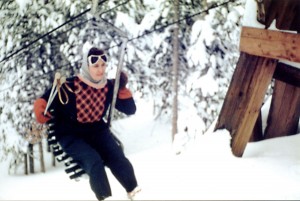By George Sibley
Three score and ten. I’m there, so a couple months ago I put on the bracelet. For all the followers of the great billygod of the burning bush, his shepherd king and poet put it right there in the Bible – Psalm 90:
The days of our years are threescore years and ten; and if by reason of strength they be fourscore years, yet is their strength labor and sorrow; for it is soon cut off, and we fly away.
But even for non-believers like myself, it’s just something that makes sense: seventy years is the reasonable expectation; after that I’m living on borrowed time, and I have to think on whom I am borrowing that time from. Hence the bracelet: “Colorado Directive” it says on one side, and “Do Not Resuscitate” on the other with my name. It is just one form of “advance directives,” instructions we can adopt to convey our will to medical people in situations where we may not be able to tell them directly, and where their default legal duty is to do everything in their power to keep us alive, at all costs and in any condition. The advance directive is an opportunity to make some up-front choices about the costs and conditions under which we want our bodies kept alive, whether the soul, spirit, mind, intelligence, whatever you want to call it, is still in that body or not.
The shepherd’s psalm goes on to say, or pray, “Teach us to number our days, that we may apply our hearts unto wisdom.” That mention of “hearts” took on a personal imperative when I was diagnosed with atrial fibrillation – a piece of heart wiring deteriorated to the point where the atrial chambers that take blood into the heart sometimes start sort of vibrating rather than beating. It is a common condition that can be inexpensively treated with medication or relatively minor surgery. But because the heart in “A-fib” is not really pulling the blood into the heart efficiently, there is risk of clots forming in the atria and getting pumped to the brain, causing a stroke. A blood thinner – usually warfarin, rat poison – is thus part of the preventative treatment. But there remains a possibility of stroke, which often results in a loss of much or all non-autonomous brain function. Dedicated medical professionals can get the pump up and running again, but the lights may be out for good. That is enough of a risk to warrant the bracelet as “heart wisdom,” in my estimation.
My partner Maryo and I got the advance-directive bracelets as the result of a lot of discussion about how to leave life as gracefully as possible – and yes, as affordably. The most horrible end of life I can imagine is for my mentally-vacant body to be sitting in a nursing home for years while Maryo is “spending down” assets to the level at which Medicaid will step in and add “custodial care” for my useless and uninhabited body to the national debt our offspring will inherit. We want to take proactive steps to preclude that slow, sad and difficult end to our life together.
Now that the ugliest election in recent history is over, and the partisan troops are hunkering down for what promises to be an equally ugly congressional term, Medicare and Medicaid “reform” are going to be on the table in a large way. A third of all Medicaid spending goes to nursing home care, much of it to people lost in a nightmare of dementia – people whose minds have gone on while their bodies have stayed behind and who have been kept alive for no discernible reason other than an apparent cultural conviction that death is bad, at any age. A quarter of all Medicare spending goes toward people in the last year of their life – basically, expensive treatments for multiple conditions from which the patients will die anyway.
But we already know that any policy discussion of what might be done about that part of the health-care puzzle will degenerate into screeds about “death panels.” This idiocy resulted from a proposal to assemble medical professionals to advise on better ways to facilitate end-of-life decisions that might spare people a lot of pain as well as a lot of expense, public and personal. I’m not sure why that is even necessary, however. There is already a great deal of information available on making end-of-life decisions; the real problem seems to be getting people to think about it, talk about it – take responsibility for it, if you will.
Is it a responsibility? “Leave it in the hands of God,” is the solution for many people – with no further action. What that means, in fact, is leaving it in the hands of medical industries that can routinely trump what was formerly accepted as the evident will of God, treating conditions that once routinely caused death in the aged. For those who would argue that those medical industries represent the will of God, I have no answer – other than to wonder why a supposedly loving God would want to impose the burden of sustained dementia on his subjects, and the burden of paying for it onto the next generation.
But for those inclined to accept their own end days as an individual responsibility, there is plenty of help and advice available – most easily accessible by just Googling “advance directive” and the name of your state, but any good doctor will help too. Conveying “durable medical power of attorney” to someone you trust to carry out your end-of-life wishes is pretty straightforward, as is preparing and filing a “living will” that says what kind of medical care you do and do not want.
The Colorado legislature adopted a new program a couple years ago that refines the “Do Not Resuscitate” bracelet directive: Colorado Medical Orders for Scope of Treatment (MOST), a one-sheet form, front and back, to be filled out with a doctor or other medical professional. It offers variations on acceptable treatment based on whether emergency people would find one breathing with a pulse or not, and what level of treatment would be acceptable until total damage could be ascertained. The program also includes the essential step of educating EMTs and other medical professionals to look for and adhere to the MOST directives.
Even among those inclined to accept this responsibility, the question usually comes down to “when is it time to get serious about this?” It is easy for people under fifty to proclaim their own intention to “not end up a human vegetable,” but it is another kind of decision as one approaches what we used to think of as the age of retirement (which in the 1930s, when that idea was democratized through Social Security, was also roughly the life expectancy). We know that many people live healthy and productive lives well into their eighties, nineties even – Herman Wouk has just published another of his long line of cultural romances at age 97. But a visit to the local nursing home shows that many people are not so lucky.
Three score and ten: I come back to that for my own accommodation to reality, seventy years – not because the Bible says so, but because it seems like a point at which one’s value to the planet and its life begins to show a negative balance, even if one is able to clog the job market by continuing to work (or needs to because the Republicans and corporations succeed in further undermining retirement plans and Social Security). Before 70, yes, like another poet said, “rage, rage against the dying of the light”; embrace the health industries’ ability to resolve situations that once meant early death. But beyond that age, think on whom the coming decades are borrowed from, and the burden of debt one can lay up on loved ones and the larger society.
Another troublesome question Maryo and I talk about – with no way to resolve now – is whether, when it comes down to it, we will have the courage of our convictions. We know of people who joined the Hemlock Society in their middle years, but withdrew from it when they got older. A relative in her nineties, who often said she no longer wanted to live, took the bracelet off after wearing it for a while.
Putting on the bracelet does not mean I am ready to die; I hope I might get another decade or two of active and productive life without ever needing resuscitation. But physical existence without a mind is, to me, truly a fate worse than death; and the bracelet and MOST form are just intelligent measures to avoid that living death. And it’s something I can do personally to help cut federal spending.
George Sibley is a freelance writer and retired educator who has just finished “Water Wranglers,” a history of the development of Colorado’s share of the Colorado River.




